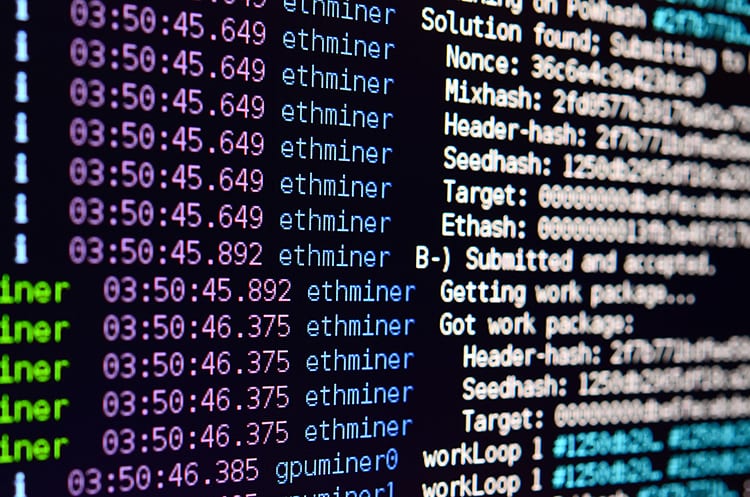 The surge of bitcoin brought cryptocurrencies from tech-nerd toy to household name, and they’re increasingly showing up in investment portfolios. Yet it’s still a mystery to most people how these digital currencies work. Are they even currency? And do they belong in an everyday person’s portfolio?
The surge of bitcoin brought cryptocurrencies from tech-nerd toy to household name, and they’re increasingly showing up in investment portfolios. Yet it’s still a mystery to most people how these digital currencies work. Are they even currency? And do they belong in an everyday person’s portfolio?
Haas News posed these questions to Prof. Christine Parlour, a leading scholar of financial markets and the banking system. In the past few years, Parlour has focused on how digital technologies, including new electronic payment methods like PayPal, are transforming the financial system and affecting the stability of banks. She taught a pioneering fintech course at Haas in 2015, and she is now organizing a new FinTech Center, which will be a hub for research on emerging financial technologies.
Recently, Parlour has given close attention to the value of bitcoin and other cryptocurrencies, a burning question in the world of finance. In a working paper, she analyzed market pricing on 222 digital coins and examined the initial coin offering market. Parlour, who holds the Sylvan C. Coleman Chair in Finance and Accounting at Berkeley Haas, shared some of her thoughts on the burgeoning cryptocurrency market.

Q: Many people have heard of bitcoin and other cryptocurrencies, but not many really understand what they are. So, what exactly are cryptocurrencies?
A: Essentially, they’re digital codes that give people the ability to consume and use services. As such, they can be traded and so they do have some sort of transfer-of-value characteristics.
Q: Do they meet the classic economic definition of money—that is, a medium of exchange, a unit of accounting, and a store of value?
A: Despite the great alliterative mouth-feel of “cryptocurrency,” they’re not really currency. Perhaps a more accurate designation would be “cryptocoupons.”
Turning cryptos into cash
Q: Whether they’re cryptocoupons or cryptocurrencies, what can they be used for?
A: Most cryptocurrencies essentially have a use-value associated with a specific underlying commodity or service. For example, sometimes they’re used as a way to compensate artists who are providing their intellectual property. Sometimes they’re used to compensate people who are providing some of their cloud storage capacity to other vendors. So, it’s pretty much anything that you can think of. I’ve even seen marketing specialists and influencers being paid with cryptocurrencies.
Q: Suppose the artist who is paid with cryptocurrency wants cold cash. How can he or she turn the cryptocurrency into conventional money?
A: There are many different exchanges that allow you to convert cryptocurrencies to U.S. dollars or whatever currency you prefer. So, you can switch them out for cash.
New asset class
Q: They’re often described as a new asset class. What’s distinctive about cryptocurrencies as an asset?
A: From a finance point of view, there are lots of things that we view as being assets. And the only thing we care about is that we can use them to get money. I can buy these claims and then, at some point, I can cash the claims back into dollar bills. Hopefully, my money, my piles of dollar bills, will have grown. So inasmuch as you can convert any of these cryptocurrencies to fiat money and back again, you can essentially view them as an asset class.
“Despite the great alliterative mouth-feel of ‘cryptocurrency,’ they’re not really currency.”
Q: Do they have any advantages as an addition to an investment portfolio?
A: What’s interesting about them from a portfolio construction point of view is they essentially add an element of diversification to the standard assets that most people have in their 401(k) plans.

Overvalued or undervalued
Q: Bitcoin and other cryptocurrencies have been among the fastest appreciating assets on record. What has driven the phenomenal increases—and subsequent price plunges?
A: That question presupposes that we know exactly why prices move, but the fact is we don’t. You might as well ask why people like Pokémon Go. I hate to get metaphysical, but essentially there are sometimes things that capture the popular imagination and people just view them as being valuable.
Q: But the market price of bitcoin isn’t metaphysical. It’s real, which raises the question of why it moved the way it did.
A: Why do we have the valuations we currently have in the stock market? People will pontificate about growth rates and outlooks, but they really have no idea.
Q: The price appreciation of bitcoin and other cryptocurrencies has drawn a lot of attention, but how can we determine their value as opposed to their price?
A: I don’t really think that’s a question that should be posed to somebody in finance.
Q: Why?
A: Well, what is the value of a Treasury bond? I can tell you what the price is and I can tell you how much I can convert it into U.S. dollars tomorrow. But the value is not clear. So, instead of asking about value, we look at changes in wealth in terms of U.S. dollars and you can certainly do that for cryptocurrencies.
Q: Do you have a personal opinion about whether cryptocurrencies are overvalued or undervalued?
A: The thing I feel very comfortable saying is that there are diversification properties associated with having some cryptocurrencies in your portfolio. We know that the returns are pretty much driven by something that’s independent of the standard things we put in portfolios. A well-diversified portfolio should have a little bit of exposure to crypto.
Buyer beware
Q: Wouldn’t it be reasonable for investors to be skittish, given the price volatility of these assets and the lack of regulation of the marketplace?
A: Yes, absolutely. But we have a lot of attempts to start up exchange-traded funds that track cryptos and these are under the usual regulatory umbrellas.
“ICOs are basically created in the febrile brain of the underlying inventor of the coin. It’s just all over the map. They’re fundamentally unregulated and the asset that’s issued doesn’t necessarily bear any resemblance to a security.”
Q: Isn’t there a concern about buying at the top of the market or buying into a heavily speculative market?
A: Yeah, but you can say the same thing about people who bought condominiums in San Francisco.
Q: I want to ask about the related area of initial coin offerings (ICOs). How does an ICO, which gives investors digital coins or tokens, differ from a standard initial public offering in which the investor gets stock providing an ownership claim in the issuing enterprise?
A: ICOs sound like IPOs linguistically, but they’re very, very different. ICOs are basically created in the febrile brain of the underlying inventor of the coin. It’s just all over the map. They’re fundamentally unregulated and the asset that’s issued doesn’t necessarily bear any resemblance to a security. If you are a smaller investor, I would say “caveat emptor,” capitalized, in italics and bold, underlined with stars around it. Basically, only buy a new coin after it has appeared on one of the crypto exchanges—or after the SEC moves forward with more oversight.